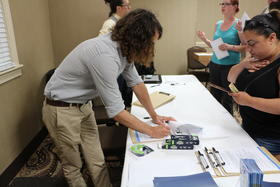
UPDATE: This story has been updated to reflect a Wednesday ruling by a federal judge.
A new law has banned online ordained ministers from officiating weddings in Tennessee.
Critics of the measure say it’s a violation of First Amendment rights. But for another group — LGBT people in rural and suburban communities — the impact could be even greater.
Leslie and Andrea Isham got married in December 2018. Their wedding was unique, for a lack of a better word.
“We literally went into the bar, we paid the cover charge,” Leslie Isham said. “We walked through the doors and sat down and just waited for the show.”
They got married in the middle of a drag show at Fusion, an LGBT nightclub in Clarksville. They were with friends, drag queens, bartenders and — of course — random people.
The Gallatin couple said they chose a gay club because it’s a place where they feel safe and not judged.
“We didn’t have to worry about protestors showing up or people being like. ‘We don’t want that here,'” Andrea Isham said. “We were surrounded by friends and surrounded by people that understand the lifestyle.”
Overseeing the wedding was their friend, an internet-ordained minister. The Ishams say that friend played matchmaker and pushed for the couple to go on dates, making her the perfect person to solemnize their vows.
When asked about her favorite part of their wedding night, Leslie Isham said, “(Andrea) saying ‘I do,’ and being able to go home and live our lives with my best friend.”
But as of July 1,
hiring an internet minister to certify a wedding is prohibited, thanks to a law passed this spring. Supporters of the measure say that, up until now, it’s been happening through a legal loophole.
“Right now it is not clear under the eyes of the law whether or not those are legal marriages,” Rep. Michael Curcio, R-Dickson, said during the debate on the measure in the state legislature.
The new law confirms that marriages officiated before July 1 by internet ministers will still be recognized. But moving forward, the state will not allow more of them to happen. Only priests, rabbis, people designated through a temple or church, and public officials will be allowed to perform weddings.

In response to this law, internet-based Universal Life Church is suing the state. They say the ban in unconstitutional.
On Wednesday, a federal judge said that the state must continue to let online-ordained ministers perform weddings until a final ruling at a later time.
The lawsuit was filed on behalf of four ordained ministers in Tennessee. It names the state attorney general, and four county clerks as defendants.
The measure’s sponsor, Rep. Ron Travis, R-Dayton, declined to comment due to the “legal situation related to the bill.”
Mass ordinations
Meanwhile, another group, American Marriage Ministries, has responded by coming to Tennessee to perform seven mass in-person ordinations across the state.
The Seattle-based nonprofit was founded with the sole purpose of ordaining people online. According to its website, they have ordained over 638,000 ministers since 2009.
Lewis King is the organization’s executive director. At an event in Clarksville last month, King and AMM facilitated over 100 in-person ordinations.
King points out not everyone identifies with a religion, and online ordinations provide options. He says this also could benefit those in traditional denominations — especially groups that oppose same-sex marriage.
“Even if you are, say, a mainstream evangelical Christian who’s got a minister, do you want your minister performing weddings for people that don’t share his values or beliefs?” King said. “It just doesn’t make sense for anybody.”
King said the federal government has already established that states need to recognize and facilitate same-sex marriages. But in conservative towns, the options are slimmer. So, this law will further dry up the pool of marriage officiants.
Someone wanting to provide more opportunities for LGBT people to marry is Kesley Page, a transgender man from Bumpus Mills, a town about 30 miles west of Clarksville. He got certified at one of the in-person ordinations. He said the law’s main target is the LGBT community.
“There’s a lot of legislation that comes out of Tennessee that really limits and restricts our rights and abilities to kind of function as citizens,” Page said. “So, to me I saw this as just like another one.”
He said that, as a newly ordained minister, he plans on offering his services to trans and non-binary people.
Meanwhile, American Marriage Ministries said they will keep ordaining people in Tennessee.
They won’t do it through the internet, though. Instead, they’ll use snail mail.


